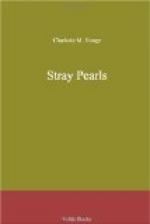‘This is well,’ said Eustace, as he looked out. ’I thank God for this! It will be all the better for her that such a good work is begun.’
‘Nay,’ said I, ’but what will the poor things do when she loses old Hunkers’s gold?’
‘Sister,’ said Eustace, ’I have left this too long, but I thought you understood that I am never like to wed my poor Millicent.’
‘Dirkius?’ I said.
’Dirkius does but confirm what I have known ever since the spring, and so have you too, Nan, that it would be a miracle should I be here after this winter.’
I had known it by my inner conviction, and heard him say the like often before; it was only a fancied outward hope that had been sustaining me, and I could obey when he bade me look cheerfully on Millicent, and remember the joy it was to him to see her at all, and, above all, employed in such tasks as would bring comfort to her.
The great Dutch house seemed full of English. Gentlewomen were sitting in the tapestried hall, spinning or working with their needle. We had been known to one or two of them in former times, and while they greeted us word was taken to Madame van Hunker that we were there, and a servant brought us word to ask us to come to her in her own parlour. There, up a few shallow steps, in a quiet, cool, wainscoted room, adorned with Eastern porcelain on shelves, we found her with her little daughter at her knee.
She met us at the door with a few faltering words, excusing herself for having given us the trouble to come to her.
‘Best so, Millicent,’ said Eustace, and as he spoke she lifted her eyes to his face and I saw a look of consternation pass over her features at sight of his wasted looks; but I only saw it for a moment, for he put an arm round her, and kissed her brow, as she hid her face against him.
The child, not contented with my embrace, ran and pulled his coat, crying, ‘My lord, my lord, I can speak English now;’ and he stooped to kiss her, while her mother turned to me with swimming eyes of mute inquiry, as of one who saw her long-cherished hope fulfilled only for her sorrow. She was less altered than had been feared. That smooth delicacy of her skin was indeed lost which had made her a distinguished beauty; but she still had a pair of eyes that made her far from insignificant, and there was an innocence, candour, and pleading sweetness in her countenance that—together, perhaps, with my pity—made even me, who had hitherto never liked her, lover her heartily.
I heard little or nothing of what they said to one another, being employed in keeping the child from them. She prattled freely in English, and was pleased to show me her baby-house, a marvel of Dutch neatness of handiwork, like that one which Madame van Hunker brought you, my daughter Peggy, when you were a little one. The doll we had given her had, however, the place of honour. Her sister, little Emilia told me, was married a month ago, and she was proceeding to make the little Dutch puppets in her baby-house enact the wedding, one being dressed in a black gown and stiff ruff, like a Genevan minister, when she caught a tone that made her cry out that mother was weeping, and stump across the floor in her stout little shoes to comfort her, before I could hinder her.




